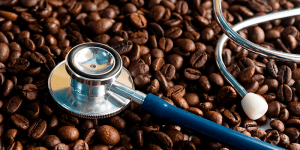El impacto de consumo de té verde y café en la reduccion de la insidencia de riesgos de infarto en la población japonesa
28-04-2017
Esta investigación evalúa la asociación entre el té verde/café y el infarto cardiaco/cerebral al analizar los datos de más de 80.000 personas que fueron seguidas por 13 años en promedio. Los investigadores llegaron a la conclusión de que entre mayor sea el consumo de té verde o café, menor es el riesgo de enfermedad cardiovascular y ACV en la población general. En los años de seguimiento, se documentaron 3425 casos de ACV y 910 de enfermedad coronaria. En comparación con las personas que tomaron poco café, la tasa de riesgo relativo ajustada por multivariables (con un intervalo de confianza del 95 %) de todos los infartos fue 0,89 (0,80 – 0,99), 0,80 (0,72 – 0,90) y 0,81 (0,72 – 0,91) para las personas que tomaban café 3 a 6 veces a la semana y 1 y 2 o más veces al día, respectivamente.
Kokubo Y, Iso H, Saito I, Yamagishi K, Yatsuya H, Ishihara J, Inoue M, Tsugane S. The Impact of Green Tea and Coffee Consumption on the Reduced Risk of Stroke, Incidence in Japanese Population: The Japan Public Health Center-Based Study Cohort. Stroke. 2013 May;44(5):1369-74. doi: 10.1161/STROKEAHA.111.677500. Epub 2013 Mar 14.
1. Sueoka N, Suganuma M, Sueoka E, Okabe S, Matsuyama S, Imai K, et al. A new function of green tea: prevention of lifestyle-related diseases. Ann N Y Acad Sci. 2001;928:274–280.
2. Sasazuki S, Inoue M, Hanaoka T, Yamamoto S, Sobue T, Tsugane S. Green tea consumption and subsequent risk of gastric cancer by subsite: the JPHC Study. Cancer Causes Control. 2004;15:483–491.
3. Kuriyama S, Shimazu T, Ohmori K, Kikuchi N, Nakaya N, Nishino Y, et al. Green tea consumption and mortality due to cardiovascular disease,
cancer, and all causes in Japan: the Ohsaki study. JAMA. 2006;296: 1255–1265.
4. Kuriyama S. The relation between green tea consumption and cardiovascular disease as evidenced by epidemiological studies. J Nutr. 2008;138:1548S–1553S.
5. Tanabe N, Suzuki H, Aizawa Y, Seki N. Consumption of green and roasted teas and the risk of stroke incidence: results from the Tokamachi- Nakasato cohort study in Japan. Int J Epidemiol. 2008;37:1030–1040.
6. Kato M, Noda M, Inoue M, Kadowaki T, Tsugane S; JPHC Study Group. Psychological factors, coffee and risk of diabetes mellitus among middle- aged Japanese: a population-based prospective study in the JPHC study cohort. Endocr J. 2009;56:459–468.
7. Lee KJ, Inoue M, Otani T, Iwasaki M, Sasazuki S, Tsugane S; JPHC Study Group. Coffee consumption and risk of colorectal cancer in a population-based prospective cohort of Japanese men and women. Int J Cancer. 2007;121:1312–1318.
8. Larsson SC, Virtamo J, Wolk A. Coffee consumption and risk of stroke in women. Stroke. 2011;42:908–912.
9. Zhang WL, Lopez-Garcia E, Li TY, Hu FB, van Dam RM. Coffee consumption and risk of cardiovascular events and all-cause mortality among women with type 2 diabetes. Diabetologia. 2009;52:810–817.
10. Kokubo Y, Iso H, Ishihara J, Okada K, Inoue M, Tsugane S; JPHC Study Group. Association of dietary intake of soy, beans, and isoflavones with risk of cerebral and myocardial infarctions in Japanese populations: the
Japan Public Health Center-based (JPHC) study cohort I. Circulation. 2007;116:2553–2562.
11. Watanabe S, Tsugane S, Sobue T, Konishi M, Baba S. Study design and organization of the JPHC study. Japan Public Health Center-based Prospective Study on Cancer and Cardiovascular Diseases. J Epidemiol. 2001;11(6 Suppl):S3–S7.
12. Ishihara J, Inoue M, Kobayashi M, Tanaka S, Yamamoto S, Iso H, et al.; JPHC FFQ Validation Study Group. Impact of the revision of a nutrient database on the validity of a self-administered food frequency questionnaire (FFQ). Epidemiol. 2006;16:107–116.
13. Sasaki S, Kobayashi M, Ishihara J, Tsugane S; JPHC. Self-administered food frequency questionnaire used in the 5-year follow-up survey of the JPHC Study: questionnaire structure, computation algorithms, and areabased mean intake. J Epidemiol. 2003;13(1 Suppl):S13–S22.
14. Standard Tables of Food Composition in Japan, the fifth revised and enlarged edition. Tokyo: Printing Bureau, Ministry of Finance, Tokyo;2005.
15. Inoue M, Kurahashi N, Iwasaki M, Shimazu T, Tanaka Y, Mizokami M, et al.; Japan Public Health Center-Based Prospective Study Group. Effect of coffee and green tea consumption on the risk of liver cancer: cohort analysis by hepatitis virus infection status. Cancer Epidemiol Biomarkers Prev. 2009;18:1746–1753.
16. Iso H, Rexrode K, Hennekens CH, Manson JE. Application of computer tomography-oriented criteria for stroke subtype classification in a prospective study. Ann Epidemiol. 2000;10:81–87.
17. Tunstall-Pedoe H, Kuulasmaa K, Amouyel P, Arveiler D, Rajakangas AM, Pajak A. Myocardial infarction and coronary deaths in the World Health Organization MONICA Project. Registration procedures, event
rates, and case-fatality rates in 38 populations from 21 countries in four continents. Circulation. 1994;90:583–612.
18. Khan N, Mukhtar H. Tea polyphenols for health promotion. Life Sci. 2007;81:519–533.
19. Lee W, Min WK, Chun S, Lee YW, Park H, Lee DH, et al. Long-term effects of green tea ingestion on atherosclerotic biological markers in smokers. Clin Biochem. 2005;38:84–87.
20. Hofmann CS, Sonenshein GE. Green tea polyphenol epigallocatechin-3 gallate induces apoptosis of proliferating vascular smooth muscle cells via activation of p53. FASEB J. 2003;17:702–704.
21. Leenen R, Roodenburg AJ, Tijburg LB, Wiseman SA. A single dose of tea with or without milk increases plasma antioxidant activity in humans. Eur J Clin Nutr. 2000;54:87–92.
22. Babu PV, Liu D. Green tea catechins and cardiovascular health: an update. Curr Med Chem. 2008;15:1840–1850.
23. Hodgson JM, Burke V, Puddey IB. Acute effects of tea on fasting and postprandial vascular function and blood pressure in humans. J Hypertens. 2005;23:47–54.
24. Hooper L, Kroon PA, Rimm EB, Cohn JS, Harvey I, Le Cornu KA, et al. Flavonoids, flavonoid-rich foods, and cardiovascular risk: a metaanalysis of randomized controlled trials. Am J Clin Nutr. 2008;88:38–50.
25. Grobbee DE, Rimm EB, Giovannucci E, Colditz G, Stampfer M, Willett W. Coffee, caffeine, and cardiovascular disease in men. N Engl J Med. 1990;323:1026–1032.
26. Lopez-Garcia E, Rodriguez-Artalejo F, Rexrode KM, Logroscino G, Hu FB, van Dam RM. Coffee consumption and risk of stroke in women. Circulation. 2009;119:1116–1123.
27. Hakim AA, Ross GW, Curb JD, Rodriguez BL, Burchfiel CM, Sharp DS, et al. Coffee consumption in hypertensive men in older middle-age and the risk of stroke: the Honolulu Heart Program. J Clin Epidemiol. 1998;51:487–494.
28. Larsson SC, Orsini N. Coffee consumption and risk of stroke: a dose-response meta-analysis of prospective studies. Am J Epidemiol. 2011;174:993–1001.
29. Kawachi I, Colditz GA, Stone CB. Does coffee drinking increase the risk of coronary heart disease? Results from a meta-analysis. Br Heart J. 1994;72:269–275.
30. Wu JN, Ho SC, Zhou C, Ling WH, Chen WQ, Wang CL, et al. Coffee consumption and risk of coronary heart diseases: a meta-analysis of 21 prospective cohort studies. Int J Cardiol. 2009;137:216–225.
31. Lopez-Garcia E, van Dam RM, Willett WC, Rimm EB, Manson JE, Stampfer MJ, et al. Coffee consumption and coronary heart disease in men and women: a prospective cohort study. Circulation. 2006;113:2045–2053.
32. Cornelis MC, El-Sohemy A. Coffee, caffeine, and coronary heart disease. Curr Opin Lipidol. 2007;18:13–19.
33. Noordzij M, Uiterwaal CS, Arends LR, Kok FJ, Grobbee DE, Geleijnse JM. Blood pressure response to chronic intake of coffee and caffeine: a meta-analysis of randomized controlled trials. J Hypertens. 2005;23:921–928.
34. Winkelmayer WC, Stampfer MJ, Willett WC, Curhan GC. Habitual caffeine intake and the risk of hypertension in women. JAMA. 2005;294:2330–2335.
35. Greenberg JA, Boozer CN, Geliebter A. Coffee, diabetes, and weight control. Am J Clin Nutr. 2006;84:682–693.
36. Iso H, Date C, Wakai K, Fukui M, Tamakoshi A; JACC Study Group. The relationship between green tea and total caffeine intake and risk for self-reported type 2 diabetes among Japanese adults. Ann Intern Med. 2006;144:554 562.
37. Kokubo Y, Okamura T, Watanabe M, Higashiyama A, Ono Y, Miyamoto Y, et al. The combined impact of blood pressure category and glucose abnormality on the incidence of cardiovascular diseases in a Japanese urban cohort: the Suita Study. Hypertens Res. 2010;33:1238–1243.
38. Tsubono Y, Kobayashi M, Sasaki S, Tsugane S; JPHC. Validity and reproducibility of a self-administered food frequency questionnaire used in the baseline survey of the JPHC Study Cohort I. J Epidemiol. 2003;13(1 Suppl):S125–S133.
39. Freedman ND, Park Y, Abnet CC, Hollenbeck AR, Sinha R. Association of coffee drinking with total and cause-specific mortality. N Engl J Med. 2012;366:1891–1904.















